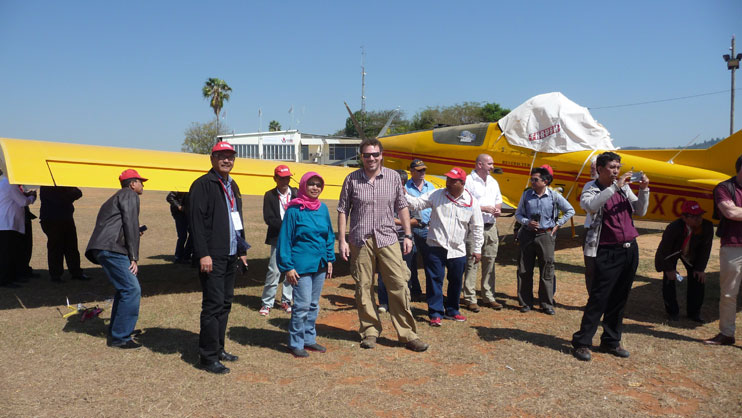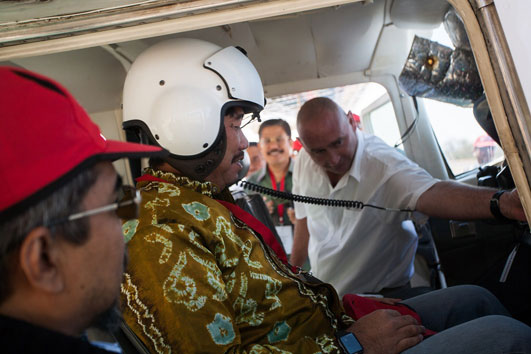Background
Forest fires across Sumatra and Kalimantan are blanketing the region with haze and pose a significant threat to human health. Additionally forest fires contribute significantly to biodiversity loss from deforestation and land use change. Especially peat-land fires heavily impact the health of people in these provinces and neighbouring countries and account for the largest source of greenhouse gas emissions in Indonesia.
Indonesia is one of many countries that are fighting against frequent forest and land fires in a fire-prone environment. In South Africa, wildfire is a natural phenomenon that occurs annually during two dry seasons.
South Africa developed a highly professional Integrated Fire Management (IFM) system, centred on the Working on Fire (WoF) Programme. WoF is a government-funded programme, through the Expanded Public Works Programme (EPWP) for the recruitment and training of young men and women from local communities. The community members are employed and trained to form wildland firefighting ground crews that conduct IFM.
Even though the ecosystems in South Africa and Indonesia differ greatly, certain aspects of the WoF Programme may be transferable to the Indonesian context and learning from the highly advanced South African integrated wildfire management system may support the development of promising fire management initiatives and successful fire management in Indonesia.

Summary
During the week of August 21 – 28, 2016, delegates from the Indonesian Government, representatives from GIZ FORCLIME, UNOPS/GAMBUT, Working on Fire and Kishugu attended a South-South technical exchange on wildfire preparedness, prevention and response. The technical exchange was made possible by GIZ FORCLIME and UNOPS/GAMBUT. Indonesian delegates attended lectures and visited WoF operations, Fire Protection Associations (FPAs), FireWise communities, Firehawk installations and the Kishugu training center in Pietermaritzburg, Nelspruit and the Kruger Park areas.
The aim of this exchange was to provide Indonesian stakeholders, at national and provincial level, with first-hand information and experience on the Integrated Fire Management system as it is implmeented in South Africa. There were possible synergies investigated during the exchange on Public Private Partnerships, legislation, financing IFM and tentative FPA development on FMU level in the Indonesian context.
Objective
The objective of this technical exchange is to provide Indonesian stakeholders at the national and provincial level with first-hand information and experience on the South African WoF programme, and to foster a discussion on the applicability/ transferability of certain aspects of the WoF model to the Indonesian context. At best, this leads to the establishment of a close technical assistance partnership between WoF and its Indonesian counterparts – a partnership that contributes significantly to improvements in Indonesia’s wildfire management system.
Study trip experiences based on the WoF model
First, the WoF programme provides valuable inputs and recommendations for the reformation of Indonesia’s recruitment and training of forest fire fighters. As indicated above, in order to reach an adequate manpower of forest fire fighting ground crews in Sumatra and Kalimantan, thousands of people have to be recruited and trained in the upcoming years. For that, participants keenly observed that the WoF programme was initiated as a job creation and social uplifting programme which was then contracted out to a private company (KISHUGU) for implementation and management. Additionally participants supported the importance of research on fire management and responses expected from the affected environment.

Second, the WoF programme shows that fire management can be combined with social development efforts – not just among the fire fighters themselves but also within the communities from which they are recruited. On the one hand, Indonesia’s forest fire fighters could become advocates for fire risk awareness among their communities. During out of fire seasons they could implement fire prevention and mitigation strategies and help local communities in better understanding the risk of fire, provide basic skills in fire response and make them aware of the potential benefits of sustainable custodianship of their environment. The participants really commenced on the improvement of communication in-between fire management stakeholders, be it the private sector or governmental institutions.
Third, the WoF funding mechanism may be transferable to the Indonesian context. WoF is funded both by government and by contributions from private land-owners (forestry concessions, farms and ranches) through so-called Fire Protection Associations (FPA). While membership in these associations is compulsory for public land owners and voluntary for private landowners, the latter are widely encouraged to participate in the FPAs through legal incentives, making them a major source of funding for the Integrated Fire Management (IFM) system. More precisely, South African land owners face stringent duties for wildfire prevention and response. As such, they can also be held accountable for the damages caused by a wildfire that started or spread from their land, unless the respective person can prove that he or she was not negligent (presumption of negligence). This is where participants were introduced to the law enforcement aspects and the underlying legislation of IFM. However, the presumption of negligence does not apply for FPA members. The FPA model is particularly relevant in combination with the Forest Management Unit (FMU) development currently being implemented in Indonesia. Follow-up meetings are planned with the Indonesian Association of forest concessionaires (APHI).
Fourth, currently Indonesia’s fire management mainly focusses on fire suppression. However suppression is only one out of many components of IFM. The WoF community awareness model may be transferable to the Indonesian context. Additional to the use of local youth in firefighting efforts, WoF has developed the FireWise Communities programme for implementation in rural and developing communities dependent on the landscape for their livelihoods. This awareness and education model could underpin a nationally coordinated community-driven awareness programme to reach out and involve all levels of Indonesian society in eliminating the majority of fires before they start. This is especially relevant in Indonesia where various agencies and companies have undertaken a variety of community awareness programmes with widely varying and often conflicting messages to the public. Due to the similarities in socio-economic conditions in communities, the WoF FireWise programme provides effective concepts for the integration of and collaboration with communities in the IFM system.
For more information, please contact:
Tobias Goedde, Strategic Area Manager, Sustainable Forest Management






